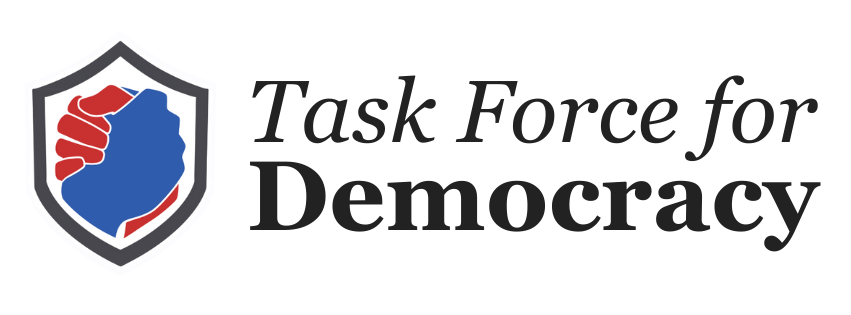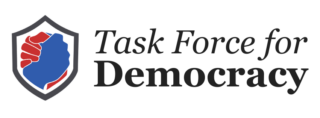By Gabrielle McNamee. Photo Josh Markowitz/The Eagle. The full article by The Eagle is available here.
The Task Force for Democracy hosted a panel of “leaders in democracy and voting rights” on Nov. 17 to discuss the future of democracy.
Task Force for Democracy is a “nonpartisan high-impact group of students empowering young Americans” with the goal of defending American democracy. President, co-founder and a sophomore in the School of Public Affairs Kaiden Ouimet opened the event by addressing the crowd.
Following the events of Jan. 6, 2021, Ouimet began the task force with a group of seven students from his home state Arizona. The group first worked to ensure communities felt empowered to take a stance to protect and create an inclusive democracy.
“As the threats to democracy evolved, so did our mission,” Ouimet said.
Today, the task force has adopted new goals specific to American University and D.C.: tackling voter suppression, advancing voter rights, removing corporate money from politics and preventing an Article V Convention.
An Article V Convention is convened solely to propose amendments to the Constitution, and amendments are ratified by three-fourths of the states. This convention removes Congress from the process of approving amendments and gives the power to the states.
Monica Hopkins, executive director of the American Civil Liberties Union of D.C., spoke to the crowd about Project 2025 and its ramifications for D.C. Hopkins said the ACLU and its affiliates across the nation had been preparing for the “inevitability” of President-elect Donald Trump winning the election for the past nine months and described Project 2025 as a roadmap of what is to come.
In the wake of Project 2025’s release, Hopkins said the ACLU began to convene affiliates from red, blue and purple states to establish plans that “create firewalls for freedom.” By working with democratic governors and attorneys general, the ACLU planned executive orders, legislation that could be passed and legislation already enacted.
“All of these things in Project 2025 can be incredibly frightening,” Hopkins said. “It’s sort of like a 900-page horror movie. But we shouldn’t just roll over.”
Hopkins closed her speech by telling the audience about starlings, small birds that fly in massive flocks to ward off predators. While in flight, some birds take breaks, stop flapping their wings and remain in the air due to the wind created by the other birds.
“During this time, while we’re making sure that as we’re working, we’re also taking the time to rest, so that we can fly even more and do it together,” Hopkins said.
Aliza Lifshitz, organizational strategy director at Voters of Tomorrow, engaged in local and state action to find alternative avenues for affirmative change following Trump’s 2016 victory. Offering her perspective, Lifshitz told the audience it was possible to contribute to the next four years to make them “manageable and productive.”
Lifshitz questioned the role of Gen-Z in bringing forth change, as she said the election illustrated the sense of distrust and apathy from Gen-Z toward institutions. Despite the distrust, Lifshitz said it was important to remember voting and running for office are acts intended to bolster democracy.
“It’s not enough to urge people to save democracy,” Lifshitz said. “We must do the work of persuasion. We must start from square one and ask, what does a democracy worth saving look like to you?”
Ultimately, Lifshitz explained it is not just about protecting democracy but also making people feel like their voice matters.
Alex Dodds, a lead organizer of Hands Off D.C., explained to the audience that Congress is capable of overturning District law.
“I just want you to picture for a moment your home, city or state, wherever you come from, and the person or the people who are in charge, who you elect, your community elects, and imagine that those folks got taken out of power and federally appointed officers were now in control of your hometown,” Dodds said. “That’s what we are facing here in the District of Columbia.”
Dodds asked the audience about their favorite parts of D.C., and attendees and Dodds celebrated its melting-pot culture, city pride, LGBTQ+ pride and the arts.
“The people of D.C. are part of a diverse neighborhood and network and community that is worth protecting,” Dodds said.
With the possibility of Congress introducing legislation that would threaten D.C.’s autonomy, Dodds emphasized the importance of continuing to mobilize and protect the District.
Brianna Cea, founder and executive director of Generation Vote, echoed Dodds’ emphasis on mobilization, yet also told the audience she stood in front of them “tired, just physically, emotionally.”
Cea attributed this tiredness to a feeling that political leaders on both sides of the aisle had failed and an “antiquated political system.” As she recalled the difficulties she experienced when she began advocacy in 2016, Cea encouraged the audience to picture the fruits of their labor.
Cea listed an automatic enrollment for all voters, changing the voting age to 16, accessible voting spaces for campuses and tribal reservations and the establishment of D.C. as the 51st state as just a few of the items Generation Vote anticipated to be a result of youth mobilization.
“We’re going to be fighting for the next three years to bring this vision to inspire thousands of our peers to take to the streets and to take to the state capitol and to the capital here in D.C. to demand a better future for our democracy,” Cea said.
Ouimet closed the event by continuing to emphasize the importance of democracy, establishing it was crucial to uplift the faith in a democracy that belongs to the people.
“This is not a time for complacency,” Ouimet said. “This is a time for conviction.”
This article was edited by Payton Anderson, Tyler Davis and Abigail Turner. Copy editing done by Luna Jinks, Sabine Kanter-Huchting and Ella Rousseau.


